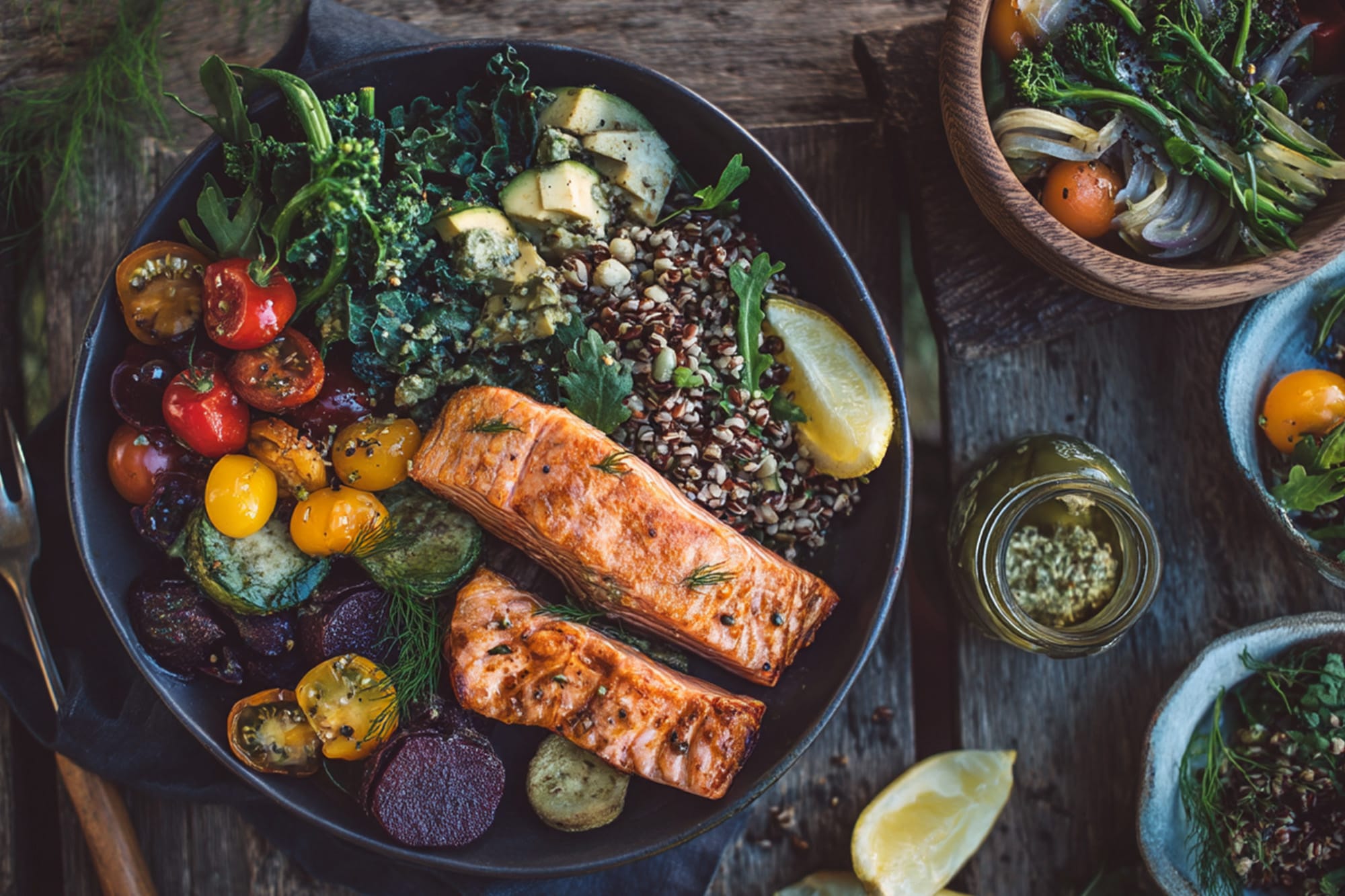Sobriety clears a lot of fog, but early recovery can still feel bumpy with energy dips, mood swings, and focus that comes and goes. That isn’t a willpower problem. Substance use often leaves behind nutritional gaps, low-grade inflammation, and a stressed gut, all of which change how the brain makes and uses its chemical messengers.
Food won’t replace therapy or medication, and it shouldn’t try, but rebuilding basic balance with enough protein, key micronutrients, steady fluids, and a calmer gut gives your brain the raw materials it needs to think more clearly and regulate mood. At the same time, you do the rest of the work.
Mental Clarity in Recovery and Why Nutrition Matters
When we say “mental clarity,” we mean:
- Attention: staying with a task without drifting.
- Memory: holding onto what you just read, heard, or planned.
- Decision-making: choosing the next step without getting stuck.
Early recovery pushes on all three. Sleep is often short or choppy. Stress hormones run high. Cravings pull attention toward quick relief. In that state, even minor nutrition slips, such as long gaps between meals, excessive quick sugar and caffeine, and insufficient protein, can tip you into jittery crash cycles that make focus and follow-through harder.
Nutrition touches the systems that drive clarity:
- Blood sugar stability: Big spikes and dips map onto irritability, brain fog, and “why did I walk into this room?” moments.
- Neurotransmitter precursors: Amino acids (for dopamine, serotonin, GABA) plus B-vitamins, iron, zinc, and magnesium are needed to build and activate the brain’s messengers. Depletion from substance use makes this assembly line run slower.
- Micronutrient stores: Consuming alcohol, stimulants, and poor dietary intake can deplete B1, B6, B12, folate, and minerals essential for mood and cognition.
- Gut signaling: An inflamed or imbalanced gut sends “noise” to the brain, amplifying anxiety and fatigue.
The key idea isn’t perfection. It’s enough consistency. Predictable, “good-enough” nutrition gives the brain steadier fuel and ingredients, so therapy lands better, sleep improves, and day-to-day choices feel less uphill.
How Addiction Disrupts Nutritional Balance
Addiction doesn’t just change behavior. It reshapes biology. Different substances stress the body in distinct ways, but the result is similar: fewer building blocks for brain chemistry and a harder time using what you do eat.
- Alcohol: Often drains B vitamins, especially thiamine (B1), needed for energy production and memory. It can also irritate and thin the gut lining, making it tougher to absorb nutrients you take in.
- Stimulants (e.g., cocaine, amphetamines): Suppress appetite and sleep, leading to protein and calorie shortfalls. Over time, this results in fewer amino acids for neurotransmitters and reduced overall micronutrient intake.
- Opioids: Slow gut motility, which can cause constipation, bacterial overgrowth, and malabsorption. Even when you’re eating, your body may not be extracting nutrients efficiently.
- Cannabis and others: Can disrupt appetite cues and metabolic rhythm, sometimes swinging between undereating and overeating, which destabilizes blood sugar and energy.
No matter the substance, the same thing tends to happen: your body takes a hit, you get dehydrated, and your sleep patterns get disrupted. That mix makes it harder to absorb nutrients and disrupts the brain chemistry needed for clear, steady thinking.
The Gut–Brain Connection, Simplified
Your gut and brain are on a constant group chat. When that chat is calm and clear, mood and focus feel steadier; when it’s noisy, brain fog and anxiety ramp up.
- Vagus nerve: A high-speed, two-way line that sends status updates between the gut and brain. When digestion is chaotic, those alerts can heighten stress signals upstairs.
- Immune system: The gut’s immune cells react to food, microbes, and stress. Inflammation in the gut can translate into brain fog and mood changes, even without obvious GI symptoms.
- Microbiome: Gut bacteria help make and regulate neurotransmitter precursors (for serotonin, dopamine, and GABA) and produce short-chain fatty acids that calm inflammation and support the blood–brain barrier.
After addiction, the gut often gets out of rhythm in ways such as bacteria being out of balance, a leakier lining, and a touchy immune system. That combo can crank up anxiety, low mood, and cravings.
The upside is that when meals become more consistent, you hydrate, and sleep finds a groove again, the gut usually settles. When the gut quiets down, the brain has a clearer lane to recover.
Key Nutrients for Mood and Cognitive Support
Your brain runs on chemistry. These nutrients supply the raw materials and cofactors that keep those pathways working, especially important after substance use has drained stores.
- B vitamins (B1, B6, B12, folate):
Act as cofactors in energy production and neurotransmitter synthesis (serotonin, dopamine, GABA). Alcohol and many stimulants lower intake/absorption, so rebuilding B-vitamin status can support memory, attention, and overall mental energy. - Omega-3 fatty acids (EPA/DHA):
Help shape neuron membranes and lower neuroinflammation, supporting mood regulation and cognitive flexibility. - Magnesium and zinc:
Involved in stress-response regulation (HPA axis), NMDA/GABA signaling, and neuroplasticity. Low levels are associated with anxiety, low mood, and poor sleep, which are common in early recovery. - Amino acids (tryptophan, tyrosine, glutamine):
Provide the precursors for serotonin (tryptophan) and dopamine/norepinephrine (tyrosine); glutamine fuels gut cells and supports GABA balance. Adequate protein intake restores this supply line after appetite suppression or poor diets. - Antioxidants (vitamin C, vitamin E, selenium):
Counteract oxidative stress heightened by substance use and sleep loss. Supporting antioxidant defenses helps protect neurons and may reduce fatigue and brain fog.
Supplements aren’t one-size-fits-all. Many people can restore these nutrients through steady meals; use supplements only when appropriate and cleared with a clinician, especially if you take medications.
Blood Sugar and Brain Function
- Why spikes and crashes hurt mood and focus:
Rapid rises in blood glucose trigger big insulin swings. The follow-on dip is often felt as irritability, fog, and urgent cravings. In early recovery, the brain is extra sensitive to “quick reward,” so sugar highs can feel great until the crash sharpens anxiety and fatigue. - How steady energy helps therapy and decisions:
A more even glucose curve supports prefrontal cortex functions, including planning, impulse control, and working memory. When fuel is predictable, it’s easier to absorb therapy, follow through on tasks, and make measured choices rather than chase quick relief. - Why addiction history magnifies the effect:
Substance use conditions the brain’s reward system to notice fast dopamine changes. Highly sweet, refined foods mimic that rapid rise, making the subsequent crash more disruptive. Building predictable, balanced intake (adequate protein + fiber with meals) lowers volatility and cravings.
Gut Health in Recovery
Your gut isn’t just about digestion. It’s part of the conversation your brain is having all day. When your gut is calmer, mood, energy, and focus usually feel steadier. In recovery, tending to that system helps everything run smoothly.
- Fiber + plant variety: Think beans, oats, fruit, and cooked veggies. They feed the “good” bugs and, over time, a more diverse microbiome is linked with steadier mood and less inflammation.
- Fermented foods (optional): A little yogurt, kefir, kimchi, or sauerkraut can help, but you don’t need them daily. Small, occasional servings are enough if they sit well with you.
- Hydration + electrolytes: Fluids keep things moving and reduce fatigue and brain fog. If you’ve been sweating or you’re extra active, simple add-ins like broth or citrus water can help replace what you lose.
- Simple, steady routines: Eat at roughly the same times, move a bit each day, and protect your sleep. Those small, repeatable rhythms beat big overhauls and give your gut–brain loop a consistent signal to settle.
Cravings, Stress, and Evening Vulnerability
Nights are when cravings love to show up. As the day winds down, serotonin dips and fatigue climbs, so your brain reaches for fast comfort, which is usually something sweet or ultra-refined. Add stress or boredom, and sugar becomes the easy button.
Skimping on basics makes it louder. Blood-sugar swings push up cortisol, which fuels anxiety and snap decisions. Doing that night after night chews away at resilience, making late-night grazing tougher to steer.
Here’s how to break the loop without white-knuckling:
- Pair it smart: If you want carbs, just add protein and fiber to keep your energy levels rising gently, rather than spiking and crashing.
- Pause on purpose: Try a quick pattern interrupt first, like a short walk, brushing your teeth, or a caffeine-free drink. Give your brain a minute before you decide.
- Pre-plan comforts: Keep two or three “safe” go-to options for low-energy nights. Taking the guesswork out lowers the pull of whatever’s closest.
How This Fits at Vered
At Vered, recovery is treated as whole-person work with structure, community, and daily rhythms that support health. If you’re looking for steady energy and mood, the team can help you think through small, sustainable nutrition anchors that fit your schedule and current care plan.
The goal isn’t a perfect diet or rigid rules; it’s reliable habits that make therapy, sleep, movement, and community participation more doable. In short, nutrition supports—not replaces—the rest of your recovery.
FAQs About Nutrition and Gut Health in Mental Clarity and Sobriety
Can food alone fix brain fog?
Not by itself. Nutrition helps stabilize energy and provides the raw materials for brain chemistry, but clarity also depends on sleep, therapy, medications (when prescribed), stress management, and time in recovery.
Which deficiencies are most common in recovery?
It varies, but alcohol and stimulants are often linked to shortfalls in B-vitamins (thiamine, folate, B6, B12), minerals like magnesium and zinc, and overall protein. Your care team can help you consider whether testing or targeted repletion makes sense.
Is the gut microbiome really tied to mood?
Yes indirectly. Gut microbes influence inflammation and produce metabolites involved in neurotransmitter pathways. When gut balance improves, many people notice steadier mood and fewer energy dips.
Do I need supplements to restore my nutrient balance?
Not always. Many people rebuild with consistent meals first. Supplements can be useful in specific cases, but quality and medication interactions matter. Ask a clinician who knows your history before adding anything new.
Why do I crave sugar so much in early sobriety?
Your brain is recalibrating reward pathways, and fatigue is higher at night. Quick carbs feel good fast, then crash. Pairing sweets with protein/fiber, keeping meals on a routine, staying hydrated, and using brief “pattern interrupts” can lower the intensity.
Clearer Days, One Habit at a Time
Nutrition isn’t about chasing perfection. It’s about repairing what addiction disrupted, including nutrient stores, gut rhythms, and brain chemistry, so your mind has the materials to heal. Small, repeatable steps make focus steadier, mood more even, and the work of recovery more sustainable.
At Vered, you’ll find a culture that supports these steady routines. If you want help weaving practical nutrition anchors into your day, reach out to the Vered team for whole-person support that fits alongside your current plan.




